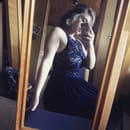Her Campus DCU Head Editor Béibhinn Thorsch discusses her experience of being polysexual
When I first realised I liked women, I was in primary school.
I saw a gorgeous young woman walk by the school, I looked at her through the bars of the fence. I tried to get some people to back me up, like “Hey, isn’t she really pretty?” and they just didn’t care.
I knew I liked boys, that was a given I thought. Compulsory heterosexuality. I mostly stayed quiet about liking women, as it slowly dawned on me that that may not be a universal experience. Luckily being so young, I didn’t get too existential about it.
Polysexuality is the ability to be attracted to more than one gender. Poly, meaning many, can be used to describe both bisexuality and pansexuality. Here I’m using it to encapsulate both of those things, as well as its own definition.
During puberty my sexuality popped its head up in a few new ways, but at the time I didn’t understand why I acted the way I did, or what my feelings meant. I would make friends with a girl, become obsessed with doing what she told me or being the best I could be so she wouldn’t leave me.
I would overwhelm her with unhealthy obsession, unable to manage how to make and keep healthy friendships. She would reject me once my behaviour became too much – the jealousy, the constant need for communication, everything – and I would crumble.
I didn’t know what was driving me to such obsession, and looking back now at the time I was just thinking of my pain and not of anything beyond it. I had yet to acknowledge within myself that I was attracted to anyone besides men, so I couldn’t reason with my feelings around women.
On the week of my thirteenth birthday I had my first kiss, with a man, while the lights were coming up at the end of the night at a teen disco. I didn’t know him; it was one of those situations where your friends find someone for you to kiss and it’s more about the act than the people doing it.
I felt as if boys found me repulsive, I’d been made fun of for my weight, excluded for years, and been the butt of jokes where people think it’s funny to tell you that someone has a crush on you.
First year of secondary school began my first roller coaster “love” story. With a girl. It was only when we started making out regularly after school that I considered that maybe I wasn’t straight.
Nonetheless, having my first relationship with a woman made me address my sexuality directly for the first time. It was kind of unavoidable.
Together we slowly admitted that we liked women. I admitted that I liked her, she knew I would do anything to make her approve of me – I was experiencing the same obsession I had with the girls in primary school. She told me that even though she liked me she didn’t want to be with me.
We learned the term “friends with benefits” at the tender age of 14. I learned more about myself than I ever had up to that point, over the next three years.
I had experiences with a boy, mostly negative too, but still something which served to teach me about myself in ways that only life experiences can do.
What’s it like to be able to like more than one gender? It’s freeing. It feels like you can overflow with love. I wish I could explain what it’s like, how the energy of those you’re attracted to has so much more variety and excitement. I’ve had equally positive and negative experiences with people on the whole length of the gender spectrum. No, I am not bothered day-to-day by the many people on the earth I could possibly be attracted to – are straight people constantly turning their head in a room full of the opposite sex?
I have had the pleasure of learning that the fluidity of gender is endless in its variety. I wouldn’t change it for the world. I’m an individual, and all of my experiences combine to make me – I’m still the same person whether I’m with a man or a woman, even if the individual relationship dynamics change slightly. The relationships themselves are no different to those which anyone else can have, the way that people interact with each other is universal – so I can relate any of my relationship experiences to anyone else’s.
The difficult parts of polysexuality which separate it from being gay or straight, cannot go without the mention of biphobia. Biphobia comes from every corner of society – homo, hetero, and even bisexuals themselves. It seems like people can understand a little easier the concrete version of sexuality that we have been taught about in popular education and even media.
Polysexuals of all types are sick of having to try to think of explanations for what made them unable to “pick a side”, and are even more sick of being asked what side they like more. Even when being asked by friends, or even other bisexuals, the feeling of having to prove your sexuality is disgusting, as well as embarrassing and insulting.
Sexuality is fluid. Gender is fluid. Explore your own, instead of insulting others.



